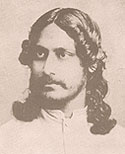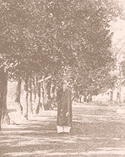 Rabindranath Tagore was born in 1861 in Calcutta, one of the sons of a wealthy Hindu religious reformer, Debendranath Tagore. Young Tagore detested conventional education, and even the private tutors employed to teach him found that his interest lay in artistic pursuits. He briefly studied Law in England. Returning to Bengal, he spent 17 years managing his family estates at Shelidah, now in Bangladesh. During this time he developed his literary talent through interaction with people, nature and the rich flora and fauna of his beloved Bengal. Rabindranath Tagore was born in 1861 in Calcutta, one of the sons of a wealthy Hindu religious reformer, Debendranath Tagore. Young Tagore detested conventional education, and even the private tutors employed to teach him found that his interest lay in artistic pursuits. He briefly studied Law in England. Returning to Bengal, he spent 17 years managing his family estates at Shelidah, now in Bangladesh. During this time he developed his literary talent through interaction with people, nature and the rich flora and fauna of his beloved Bengal.
He published his first book of poetry "A Poet's Tale" when he was only 17.Then followed a novel Karuna, the stage - play The Tragedy of Rudrachandra and a succession of great works including Gitanjali (Song Offerings), a collection of mystic and devotional songs. Tagore received the Nobel Prize for Literature in 1913 for his English translation of Gitanjali. He is the first Asian to have had this honour. He was knighted in 1915, but he relinquished it in protest at the British massacres of civilians including children in the Punjab.
|
 He is not regarded as a revolutionary poet in the mould of Nazrul or the Tamil poet Subramanium Bharti. Nevertheless, he was not a pacifist and his political leaning was for social justice, freedom and equality. His great contribution in the field of education was the establishment of Santiniketan in 1901 - a communal school that blended the philosophical and the educational systems of the East and West. This later developed into the University of Visva-Bharati. He is not regarded as a revolutionary poet in the mould of Nazrul or the Tamil poet Subramanium Bharti. Nevertheless, he was not a pacifist and his political leaning was for social justice, freedom and equality. His great contribution in the field of education was the establishment of Santiniketan in 1901 - a communal school that blended the philosophical and the educational systems of the East and West. This later developed into the University of Visva-Bharati.
He travelled widely in the 1920s and '30s. Through his lectures, addresses and writings he expounded his vision about the world. Oxford University held a special Convocation at Santiniketan in 1940 to confer a Doctorate on Tagore.
Two of Tagore's songs were adopted as the National Anthems of India and Bangladesh. Tagore died in 1941. His legacy as one of the greatest poets lives on.
|